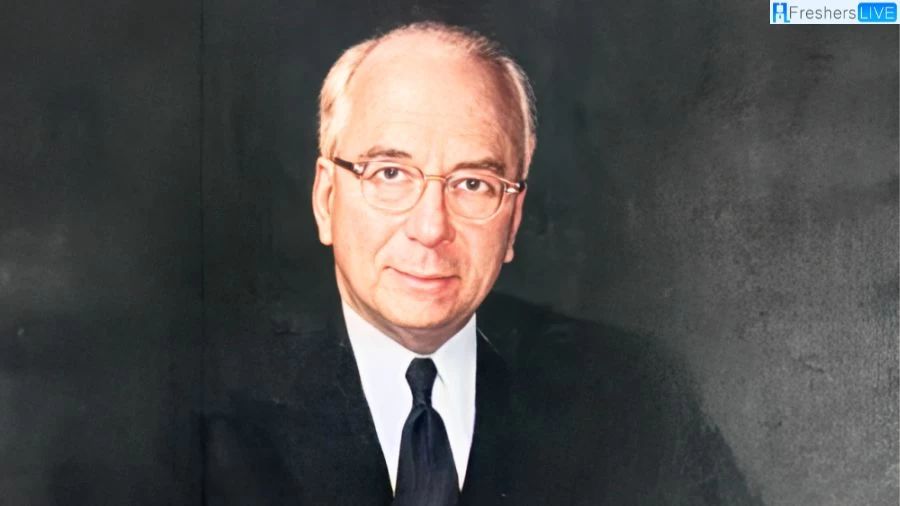What Happened to Lewis Strauss After Oppenheimer? Who Plays Lewis Strauss on Oppenheimer?
by Rajesh
Updated Jul 20, 2023

Who is Lewis Strauss?
Lewis Strauss was an influential American figure known for his involvement in politics and public service. Born on January 31, 1896, in Charleston, West Virginia, he embarked on a successful career that spanned several decades. Strauss played a crucial role in various government positions, including serving as Chairman of the United States Atomic Energy Commission (AEC) during the 1950s.
His tenure at the AEC became contentious when he denied J. Robert Oppenheimer, the "Father of the Atomic bomb," security clearance, resulting in a highly debated and controversial decision. Apart from his role in the AEC, Lewis Strauss was also nominated to become the U.S. Secretary of Commerce by President Dwight Eisenhower. However, his nomination was met with opposition from the Senate, leading to its failure and a significant setback in his political career.
Despite these challenges, Strauss continued to remain active in public service, engaging in philanthropic endeavors and maintaining relationships with former Presidents such as Eisenhower and Herbert Hoover. Lewis Strauss passed away on January 21, 1974, leaving behind a complex legacy marked by both successes and controversies in the realm of American politics and public life.
What Happened to Lewis Strauss After Oppenheimer?
After the events involving J. Robert Oppenheimer and the United States Atomic Energy Commission (AEC), Lewis Strauss faced a tumultuous period in his political career. His decision to deny Oppenheimer's security clearance led to significant controversy and opposition. Subsequently, when his term with the AEC ended in June 1958, President Dwight Eisenhower nominated him to become the U.S. Secretary of Commerce.
However, Strauss's nomination was met with staunch resistance from the Senate, culminating in its failure – the only 18th time in U.S. history that a Cabinet appointee was refused by the Senate. This rejection marked the end of Strauss's time in government service and marked a turning point in his post-Oppeheimer life. Despite his setback in politics, Lewis Strauss didn't retreat entirely from public life.
He retired to his farm, the Brandy Rock Farm, situated in Brandy Station, Virginia, where he found solace in farming activities, including cattle breeding. Despite embracing a quieter life on the farm, Strauss remained committed to various philanthropic endeavors, with particular attention to supporting the American Jewish Committee.
While living on his farm, Strauss also penned his memoir, "Men and Decisions," in an attempt to remind the public of his service before he became entangled in the complexities of politics. Though his legacy remained tainted due to the controversies surrounding Oppenheimer and the Senate rejection, Strauss passed away in 1974 after battling lymphosarcoma for three years, leaving behind a complex and eventful life intertwined with the world of politics and public service.
Albert Einstein Manhattan Project
Albert Einstein played a pivotal role in the early stages of the Manhattan Project, a top-secret research program aimed at developing atomic weapons during World War II. In 1939, Einstein, along with physicist Leo Szilard, composed a letter to President Franklin D. Roosevelt, warning of the potential threat posed by Nazi Germany's pursuit of nuclear weapons.
This influential letter urged the US government to initiate its own nuclear program promptly. As a result, the Manhattan Project was officially launched in August 1942, bringing together some of the brightest minds in science, engineering, and military strategy to work towards harnessing the power of the atom. Despite his initial involvement in urging the creation of the Manhattan Project, Einstein did not actively participate in its covert operations, and he was denied security clearance due to concerns about his political views.
His theoretical work, most famously summarized in the equation E=mc^2, laid the foundation for understanding nuclear reactions, which proved instrumental in the project's development. Although Einstein's direct involvement was limited, his early contributions and advocacy were crucial in setting the wheels in motion for the Manhattan Project, ultimately leading to the development of the world's first atomic bombs, which had a profound impact on the outcome of World War II and the course of history.
Who Plays Lewis Strauss on Oppenheimer?
In Christopher Nolan's biographical film "Oppenheimer," the character of Lewis Strauss, an influential figure in American politics and public service, is portrayed by the talented actor Robert Downey Jr. Known for his iconic role as Iron Man in the Marvel Cinematic Universe, Robert Downey Jr. takes on the challenging task of embodying the complexities of Lewis Strauss, who played a significant role in convincing President Franklin D. Roosevelt to launch the Manhattan Project, the ambitious effort to develop the world's first atomic bomb during World War II.
As the film delves into the story of physicist J. Robert Oppenheimer's work on the Manhattan Project and his interactions with various key figures, Downey Jr.'s portrayal of Lewis Strauss adds depth to the narrative, capturing the controversies surrounding Strauss's political views and the challenges he faced in his political career.
What Happened to Lewis Strauss After Oppenheimer - FAQs
Lewis Strauss was an influential American figure involved in politics and public service.
Lewis Strauss played a crucial role in convincing President Franklin D. Roosevelt to initiate the Manhattan Project.
US officials were concerned about Lewis Strauss's left-leaning political views, which they deemed a security threat.
After leaving government service, Lewis Strauss retired to his farm, engaged in farming activities, and remained active in philanthropy.
Actor Robert Downey Jr. portrayed Lewis Strauss in Christopher Nolan's film "Oppenheimer."







